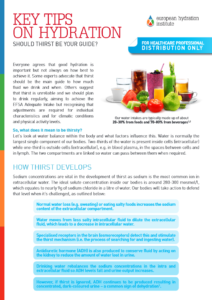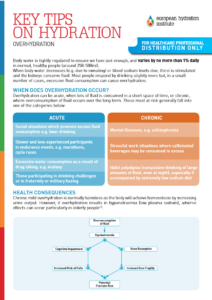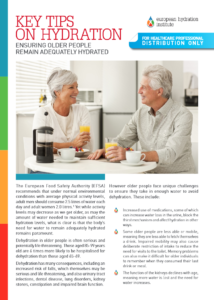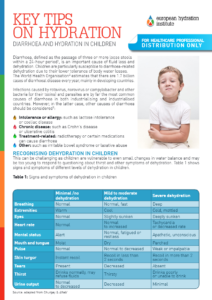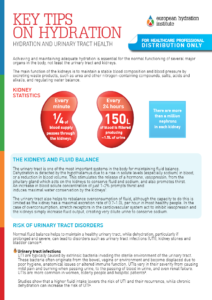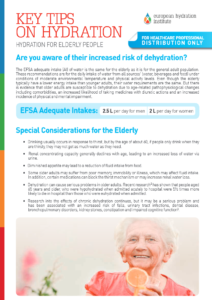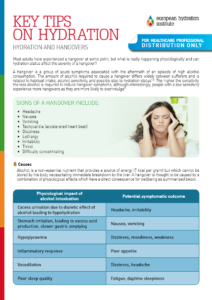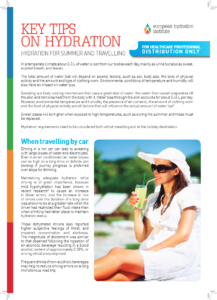Key Tips on Hydration
Overhydration
Body water is tightly regulated to ensure we have just enough, and varies by no more than 1% daily in normal, healthy people (around 250-500ml). When body water decreases (e.g. due to sweating) or blood sodium levels rise, thirst is stimulated and the kidneys conserve fluid. Most people respond by drinking slightly more but, in a small number of cases, excessive fluid consumption can cause overhydration. In this new issue the effects of overhydration are reviewed, and practical tips to prevent it are provided.
Ensuring older people remain adequately hydrated
While activity levels may decrease as we get older, as well as the amount of water needed to maintain sufficient hydration, the body’s need for water to stay adequately hydrated remains paramount. Yet older people face unique challenges to ensure they stay adequately hydrated. The latest edition of our Key Tips on Hydration series provides tips and advice on ensuring older people remain adequately hydrated.
Key Tips on Diarrhoea and Hydration in Children
With their lower tolerance of body water losses, children are particularly susceptible to diarrhoea-related dehydration. Dehydration resulting from diarrhoea may pose even more of a problem in younger children who may be unable to respond adequately to questioning about thirst and other signs of dehydration.
The latest edition of our Key Tips series contains information about the causes of diarrhoea and practical advice for recognising and managing diarrhoea in children.
Key Tips on Hydration – Hydration and Urinary Tract Health
Achieving and maintaining adequate hydration is essential for the normal functioning of several major
organs in the body, not least the urinary tract and kidneys. Learn more about the relationship between hydration and urinary tract health in this edition of our Key Tips on Hydration series.
Key Tips on Hydration – Hydration for elderly people
“Hydration for elderly people” explores the special considerations related to hydration in older people, including why elderly people can have an increased risk of dehydration. It also offers practical advice to help keep elderly people well hydrated.
Key Tips on Hydration – Hydration and Hangovers
Most adults have experienced a hangover at some point, but what is really happening physiologically and can hydration status affect the severity of a hangover? Learn more about the relationship between hydration and hangovers in this edition of our Key Tips on Hydration series.
Key Tips on Hydration – Hydration for Summer and Travelling
In a temperate climate about 2-3 L of water is lost from our bodies each day, mainly as urine but also as sweat, expired breath, and faeces.
The total amount of water lost will depend on several factors, such as sex, body size, the level of physical activity and the amount and type of clothing worn. Environmental conditions of temperature and humidity will also have an impact on water loss.
